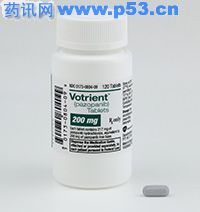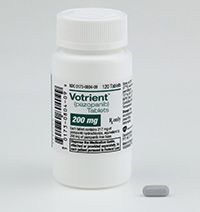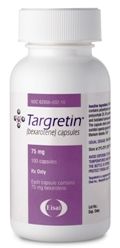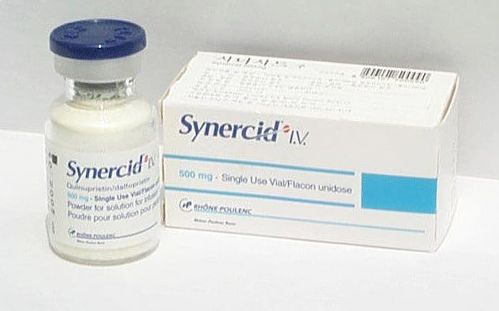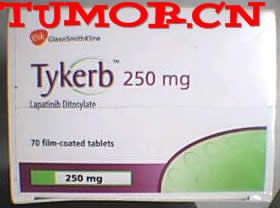| Indication(s):
Advanced renal cell carcinoma. Pharmacology:Pazopanib is a multi-kinase inhibitor of vascular endothelial growth factor receptor (VEGFR)-1, VEGFR-2, VEGFR-3, platelet-derived growth factor receptor-α and-β, fibroblast growth factor receptor-1, and -3, cytokine receptor, interleukin-2 receptor inducible T-cell kinase, leukocyte-specific protein tyrosine kinase, and transmembrane glycoprotein receptor tyrosine kinase. Clinical Trials:Pazopanib was evaluated in a placebo-controlled Phase 3 study involving 435 patients with renal cell carcinoma. Patients were randomized (2:1) to receive pazopanib 800mg or placebo once daily. In this trial, the overall median progression free survival (PFS) was 9.2 months with pazopanib and 4.2 months with placebo. Treatment-naive patients who received pazopanib experienced 11.1 months of median PFS vs 2.8 months with placebo. Additionally, patients who had previously received cytokine-based treatment achieved 7.4 months of median PFS with pazopanib vs 4.2 months with placebo. Legal Classification:Rx Adults:Take on an empty stomach. Swallow whole. 800mg once daily. Hepatic impairment: moderate: 200mg once daily; severe: not recommended. Concomitant strong CYP3A4 inhibitors (eg, ketoconazole, ritonavir, clarithromycin): avoid; if warranted, reduce dose of pazopanib to 400mg; may reduce further if toxicity occurs. Concomitant strong CYP3A4 inducers (eg, rifampin): avoid. Children:Not recommended. Precaution(s):Monitor liver tests before starting and at least once every 4 weeks for at least the first 4 months of treatment, then periodically. If ALT between 3xULN and 8xULN continue therapy with weekly monitoring until ALT returns to Grade 1 or baseline. If ALT >8xULN interrupt therapy until ALT returns to Grade 1 or baseline; may consider reintroducing at a reduced dose, measure liver tests weekly for 8 weeks; if ALT>3xULN recurs, permanently discontinue. Permanently discontinue if ALT>3xULN and bilirubin >2xULN. Gilbert’s syndrome (see literature). History of QT prolongation. Cardiac disease. Monitor ECG, electrolytes (eg, calcium, magnesium, potassium), thyroid, urinalysis. History of hemoptysis, cerebral, or clinically significant GI hemorrhage in the past 6 months: not recommended. Risk of arterial thrombotic events (within previous 6 months: not recommended). Discontinue if severe and persistent hypertension (despite antihypertensive therapy and dose reduction) or if Grade 4 proteinuria occurs. Stop therapy at least 7 days before surgery; discontinue in patients with wound dehiscence. Pregnancy (Cat.D), nursing mothers: not recommended. Interaction(s):See Adult dosing: Potentiated by strong CYP3A4 inhibitors, grapefruit juice. Antagonized by strong CYP3A4 inducers. Concomitant drugs with narrow therapeutic windows metabolized by CYP3A4, CYP2D6, or CYP2C8: not recommended. Caution with concomitant drugs that prolong QT interval (eg, antiarrhythmics). Adverse Reaction(s):Diarrhea, hypertension, hair color changes, nausea, anorexia, vomiting; hepatotoxicity (may be severe or fatal), QT prolongation, hemorrhagic events, arterial thrombotic events (eg, MI, angina, ischemic stroke, TIA), GI perforation or fistula, impaired wound healing, hypothyroidism, proteinuria. How Supplied:Tabs 200mg—30, 90, 120 Last Updated:2/3/2010 |
|


